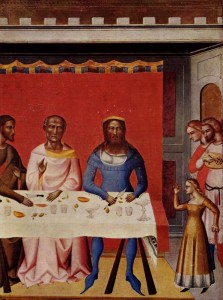Luke 13:31-35
This text is used for the Lectionary Year C on February 21, 2016.

In the previous passage, we find Jesus making his way to Jerusalem, teaching about the kingdom of God and curing many illnesses as he passes through villages and towns. While some choose to follow him, delighting in his works and praising God, not all welcome him warmly. Cold and calculating responses to Jesus’ presence intensify as he arrives in Jerusalem. In fact, verse 31 opens with a very serious warning. A group of Pharisees come to Jesus and urge him to leave the city because Herod is seeking to kill him. This is no idle threat. Herod is a powerful political figure who has already shown his penchant for violence in the imprisonment and beheading of John (Luke 3:19-20; 9:9). Luke confirms that Herod has heard the perplexing reports about Jesus’ miracles and those of his followers, and he has been seeking an opportunity to see Jesus for himself (Luke 9:7-9). According to this group of Pharisees, Herod’s curiosity has taken a dark turn. Jesus’ ministry in Jerusalem and his very life are now at stake. This kind of ministerial success does not come without significant opposition and even the possibility of death.
Luke’s account of the events gives no information about Herod’s motives or those of the Pharisees who warn Jesus. Instead the author focuses on the nature of Jesus’ response to the aggressor. Rather than heed the warning and make preparations to flee as most would be tempted to do, Jesus faces the threat head on. He speaks confidently, sending Herod the message that he will continue battling evil and bringing healing until he reaches his intended goal. While Herod may act like a fox, he is not a true obstacle to Jesus’ ministry. According to rabbinic resources, a fox may be described as a pretender or a weakling. Jesus could be suggesting here that Herod does not have what it takes to follow through on his plans. We get the message that no earthly power or personage will thwart the purposes of God that Jesus was anointed to accomplish (Luke 4:17-19).

